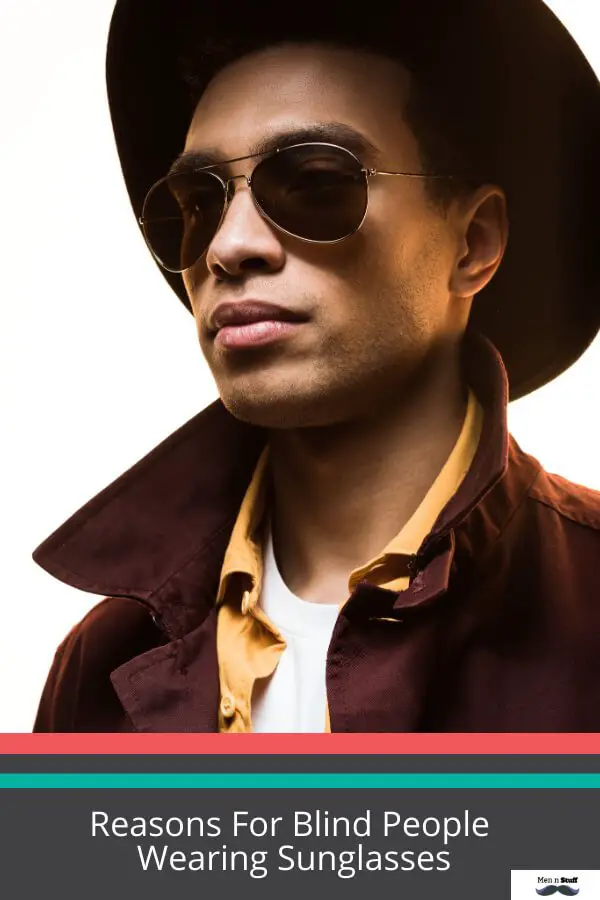Blind people wear sunglasses for a variety of reasons, including:
- To protect their eyes from harmful UV rays.
- To reduce glare and discomfort from bright light.
- To protect their eyes from dust and other debris.
- To signal to others that they are blind and may need assistance.

How Can Sunglasses Protect Blind Individuals?
Sunglasses can provide various forms of protection for blind individuals, enhancing their overall comfort and well-being. Here are the details of how sunglasses can offer protection to blind people:
- Light Sensitivity: Many blind individuals have heightened sensitivity to light, a condition known as photophobia. Sunglasses with tinted or polarized lenses can help reduce the intensity of light entering their eyes, making it more comfortable for them to navigate in bright environments.
- Eye Comfort: Blind individuals may experience discomfort, dryness, or irritation in their eyes due to exposure to wind, dust, or air conditioning. Sunglasses act as a barrier, shielding their eyes from these environmental factors and maintaining eye moisture and comfort.
- Privacy and Confidence: Wearing sunglasses can provide blind individuals with a sense of privacy and independence. It conceals their eye movements or gaze direction, allowing them to maintain their personal space and interact with others more confidently.
- Psychological Comfort: Sunglasses can offer psychological comfort by reducing the feeling of exposure. Blind individuals may feel self-conscious about their eye appearance or movements, and sunglasses can help them feel more at ease in social situations.
- UV Protection: Sunglasses equipped with high-quality lenses, such as those with 100% UV protection and UV-400 blocking capabilities, can safeguard blind individuals from harmful ultraviolet (UV) radiation. Prolonged UV exposure can contribute to eye health issues, and sunglasses help mitigate this risk.
- Safety from Debris: While navigating outdoor environments, blind individuals are susceptible to airborne debris like dust, dirt, or insects. Sunglasses act as a protective barrier, preventing these particles from directly reaching their eyes and causing discomfort or injury.
- Enhanced Mobility: By reducing glare and bright reflections, sunglasses improve visibility for blind individuals when walking or traveling outdoors. This enhanced vision can help them avoid obstacles and navigate unfamiliar terrain more safely.
- Reduced Strain: Sunglasses can reduce eye strain caused by excessive squinting or adjusting to varying light conditions. This is especially beneficial for blind individuals who may have residual vision or light perception, as it helps preserve their existing visual comfort.
Different Types Of Sunglasses for Blind People
1. Tinted Prescription Glasses
Tinted prescription glasses are ideal for blind people who still discern light and basic shapes. The glasses feature a subtle coloration, typically in hues of amber or grey. These sunglasses help to reduce light sensitivity and glare, which are key issues that partially blind people face.
2. UV-blocking Sunglasses
UV-blocking sunglasses are extremely beneficial for the blind as protection against harmful ultraviolet rays. Even without vision, exposure to UV rays can still lead to health problems like skin cancer around the eyes or on the eyelids. Therefore, these sunglasses are a must for blind individuals spending a significant amount of time outside.
3. Polarized Sunglasses
Polarized sunglasses are another brilliant option for individuals with impaired vision. These glasses not only reduce glare from bright light but also retain contrast, allowing partially blind people to discern variations in brightness.
4. Photochromic Lenses
Photochromic lenses react to changes in natural light, darkening in brighter conditions, and lightening when the sunlight is not as strong. These changes help to protect the eye from damage, even if the person wearing them cannot see.
5. Fitover Sunglasses
Fitover sunglasses are an ideal choice for blind people who wear prescription eyeglasses. They are designed to fit over regular eyeglasses, providing extra protection from the sun.
| Type of Sunglasses | Key Benefit |
|---|---|
| Tinted Prescription | Reduce light sensitivity and glare |
| UV-Blocking | Protect against harmful UV rays |
| Polarized | Reduce glare and retain contrast |
| Photochromic Lenses | React to changes in natural light |
| Fitover Sunglasses | Fit over regular eyeglasses for extra protection |
These different types of sunglasses provide essential protection and comfort for blind or visually impaired individuals. The choice will largely depend on the individual’s level of vision, personal comfort, and ones specific needs.
Reasons For Blind People Wearing Sunglasses
UV Protection
Sunglasses are not only beneficial to ordinary people who want to protect their eyes from ultraviolet light exposure, but they are also useful for blind people, especially when they’re out at the peak of the summer season. Ultraviolet light exposure has been linked with the risky problems of the eyes, which include macular degeneration, pterygia, pingueculae, and photokeratitis.
Visually impaired people don’t have the ways to know about the bright light of the sun, so it becomes crucial for them to use sunglasses before they decide to go outside their homes.
Some of the sunglasses may also have lenses that can block the harmful ultraviolet rays from reaching the eyes of blind people. Such lenses are embedded in most of the sunglasses.
Aesthetic Reasons
Due to aesthetic reasons, blind people choose to wear sunglasses even if they can’t see. There can be facial disfigurations of blind people around the eyes. They may have discomfort seeing people.
They find it easier and approachable to interact with other people. While blind people feel that people can sustain and maintain eye contact, it is difficult for them to do so. Sunglasses help them to get rid of the discomfort of maintaining eye contact with people who can see.
Seek Attention And Alert Others
Blind people wear sunglasses to make them communicate their blindness. Besides, walking with a cane also helps to let people know about their visual impairment. It works as a safety tool when they are in a crowded place.
Increase Vision
Many blind people can figure out different shapes and sizes when they are exposed to minimum glare from the sun. It is advised to speak to a blind person in the shade.
Some blind individuals have tunnel vision which gives them narrow vision. It is best to wear sunglasses that can be seen narrowly as it helps them focus on their vision.
Protection From Injury And Contamination
Many blind individuals wear sunglasses both outdoors and indoors as it will help them get an extra layer of protection against any objects or physical dangers.
It is challenging for a blind person to shield their eyes or turn away from potential hazards. Hence, sunglasses help them in getting injured or having contamination.
Issue Of Brightness
Indeed, visually impaired people may not know the objects in front of them, but they can sense the brightness of the sun. Vision and light sensitivity are entirely two different things. When blind people wear sunglasses, they can protect themselves from brightness, and will not make their eyes worse.
Protection From Physical Dangers
To know about specific dangers and awareness of the environment is a significant challenge for blind people. They do not know when an object or particle is about to hit them. The physical dangers can be in the form of dust particles, objects, leaves, etc. These can easily harm and hit blind people.
Therefore, wearing sunglasses will help them protect their eyes from physical dangers. UV rays are harmful to the eyes, and it is challenging for a visually impaired person to identify and protect their eyes from getting exposed to UV rays. Hence, sunglasses are helpful to protect their eyes from the sun’s rays.
Unique Sunglasses For Blind People
Many blind people wear Plano or non-prescribed sunglasses, while others need specific glasses. Some people are not entirely blind, so, they need eyewear to filter particular colors of light. These people can wear prescription sunglasses to enhance their sight.
The low-vision specialist will provide you with the latest digital devices and visual aids to improve your eyesight.
The vision needs vary widely, so it is vital to know that blind people wear sunglasses to keep their eyes comfortable and safe.
How Does The Blind Individual’s Eye Look Like?
People experience blindness due to many reasons from eyeball problems to the visual cortex. Some people are blind from visual pathways or their optic nerves.
Some blind individuals have strabismus or misaligned eyes. The eyes of blind people are similar to ordinary people’s eyes. They can’t see anything. People who suffer blindness due to accidents may have damage or scars on their eyes. It may give them a horrible appearance.
It would help if you protected your eyes as it is one of the most significant parts of our body.
Types Of Sunglasses
Various types of sunglasses have come up to look stylish and protect themselves from sun rays. In this article, we will talk about some of the famous and beautiful styles of sunglasses.
Pilot Sunglasses: With the metal frame and teardrop shape, these pilot sunglasses have a distinct look from the category of the classic.
Butterfly Sunglasses: Covering the face to a great extent is what makes the sunglasses known as butterfly sunglasses, and they are unique in shape.
Cat-Eye Sunglasses: It’s got a completely different charm to use cat-eye sunglasses because these show the styles of feline feminity.
Clubmaster Sunglasses: There is a thicker frame on the top, giving it a classic look for the wearer.
Oval Sunglasses: As far as the basic sunglasses are concerned, this is where the sunglasses of oval shapes get fitted.
Rectangle Sunglasses: With angular corners, rectangular sunglasses have made their presence felt among individuals, and even blind people love them.
Semi-Rimless Sunglasses: There is an absence of the frame, and its frame is on the downside and upside, respectively.
Round Sunglasses: Different kinds of color frames and materials come with round sunglasses, and they give an outlandish look to the faces of the users.
Shield Sunglasses: If anyone wants to be outside for a long time, then it is essential to wear sunglasses, and the shield sunglasses will be perfect.
Square Sunglasses: These sunglasses can shape the jawline, giving some angles to the round face.
Wayfarer Sunglasses: These sunglasses have got a signature frame with a trapezoidal shape.
Sunglasses Brands
Several brands are available in the market that provide sunglasses with different designs and colors. Let’s know about some of the brands of sunglasses in the table below.
| S. No. | Brands | Sunglasses Specialities |
| 1 | Ray-Ban | Due to the versatile frames and sunglasses of wayfarers and pilots, Ray-ban is a trendy brand. |
| 2 | Burberry | Along with the classic designs, the customers can get sleek shapes only from the famous brand of Burberry. |
| 3 | Tory Burch | Unique elements and established textures go with the brand of Tory Burch. |
| 4 | Prada | Coveted frames and innovative designs make the brand of Prada very popular. |
Frequently Asked Questions
Q1. Can Sunglasses Help To Boost The Confidence Of Blind Individuals?
Q2. What Kind Of Sunglasses Should Blind Individuals Use?
Q3. Why Do Blind People Wear Dark Glasses?
Q4. What Are Some Of The Smart Glasses For Blind People?
References:
https://www.medicalnewstoday.com/articles/why-do-blind-people-wear-sunglasses
https://www.healthline.com/health/eye-health/why-do-blind-people-wear-sunglasse

